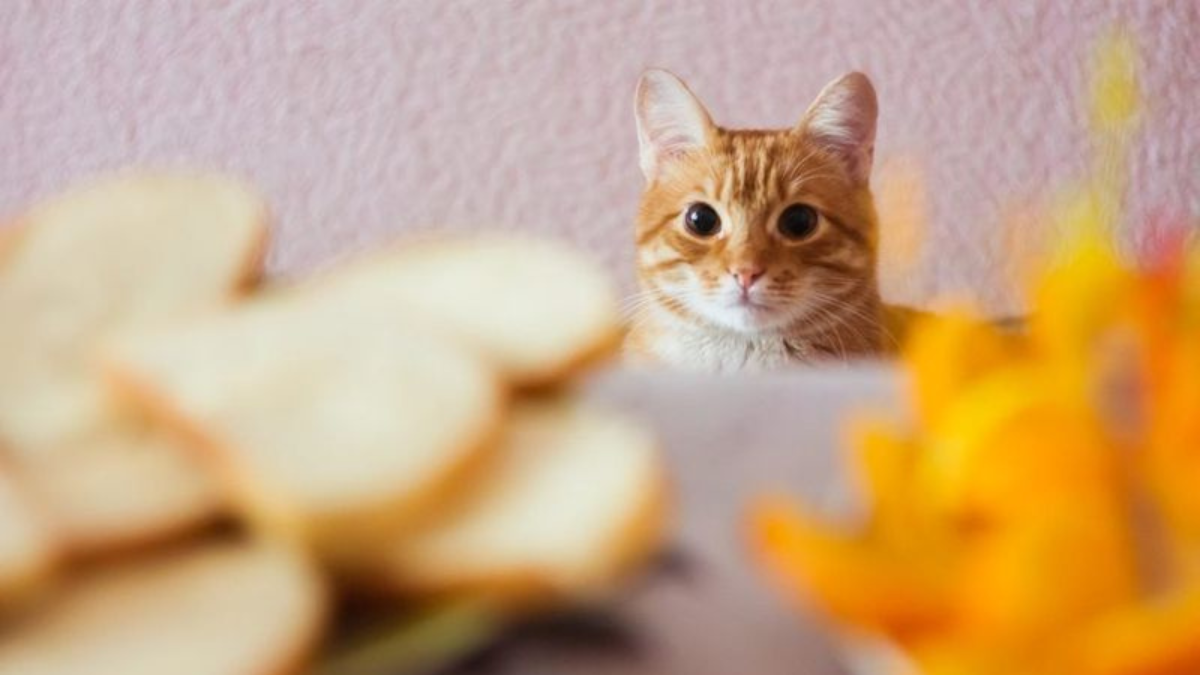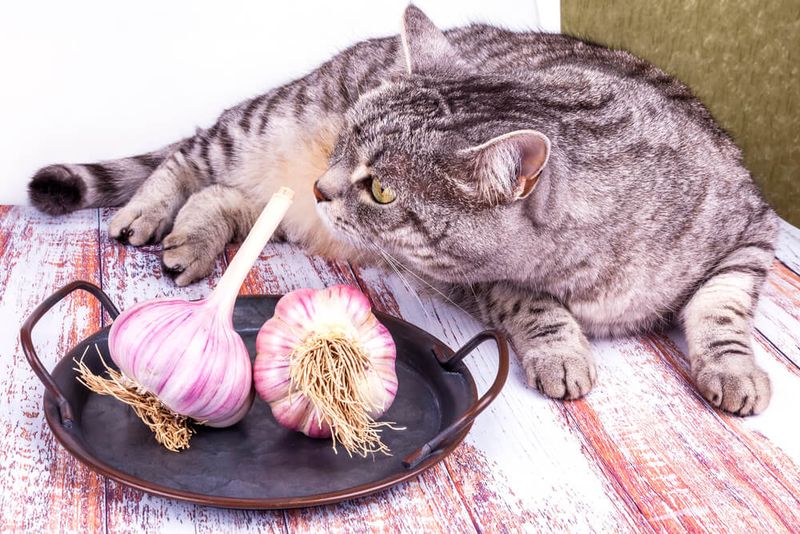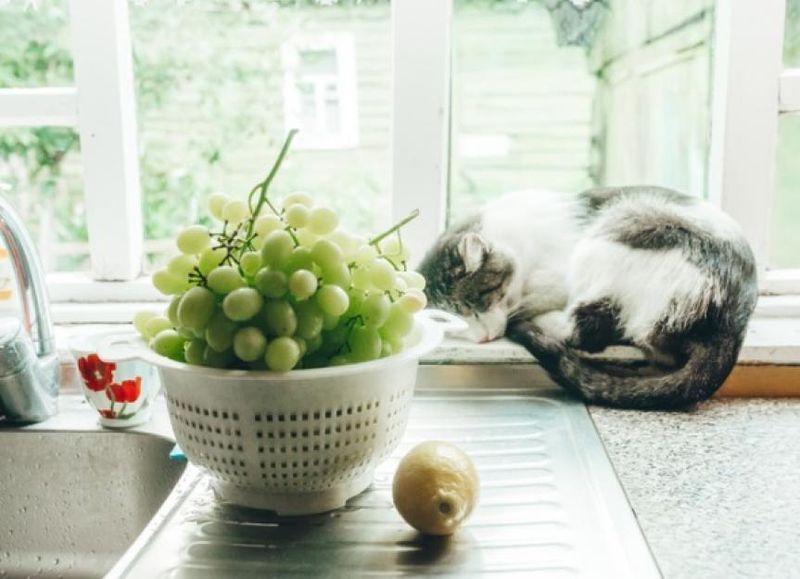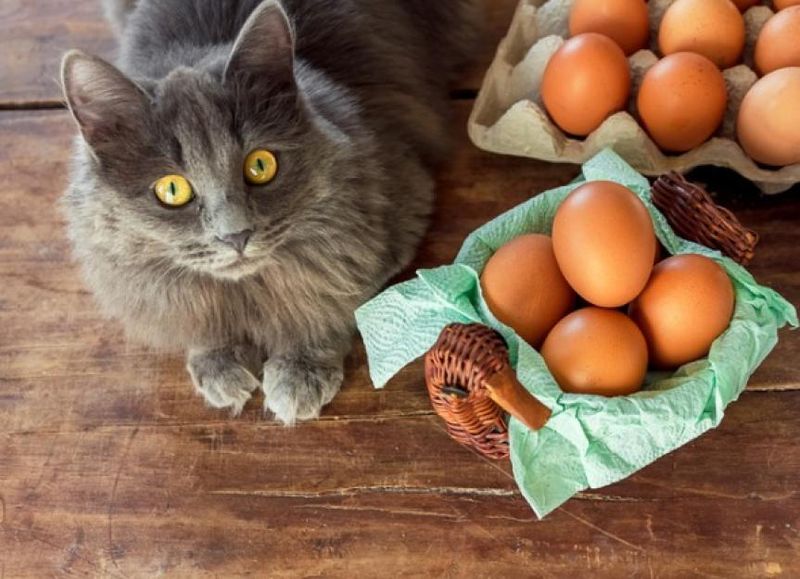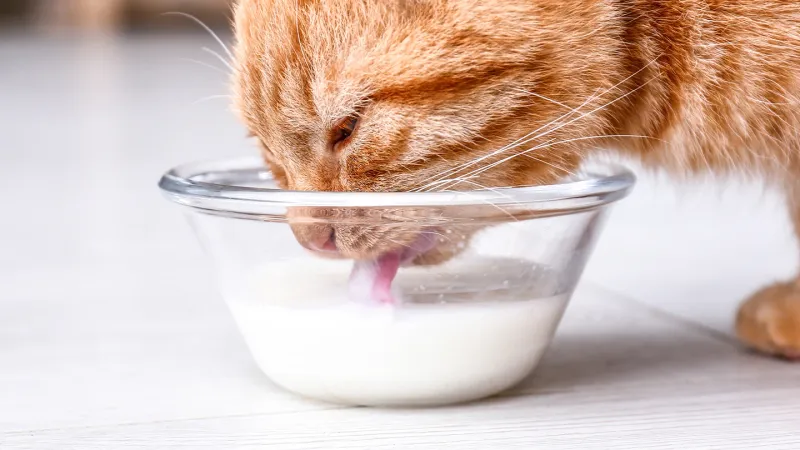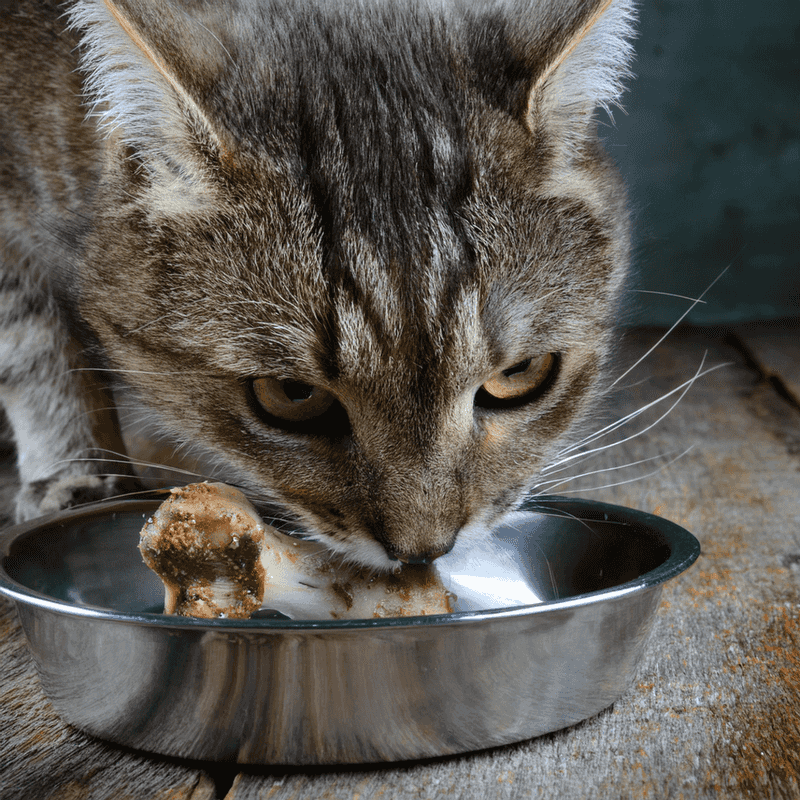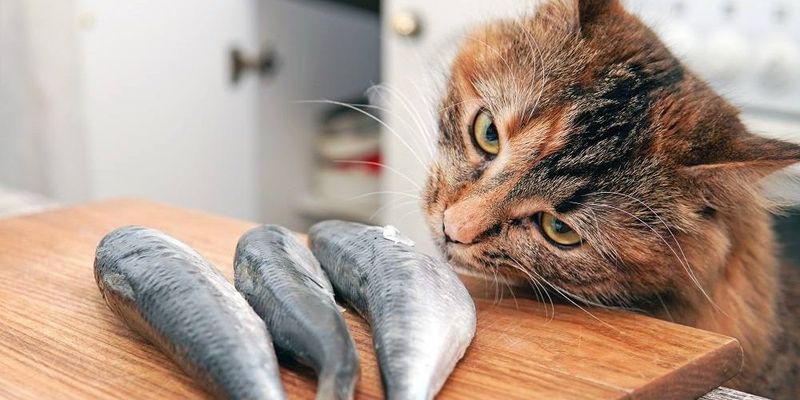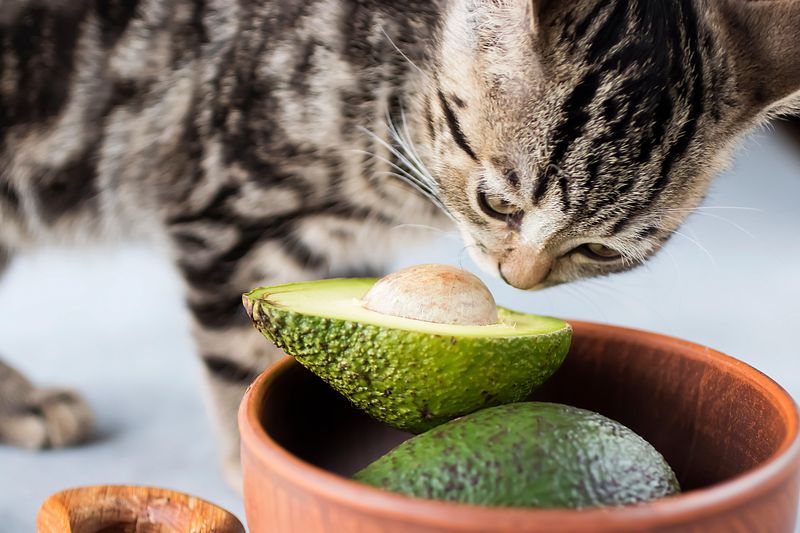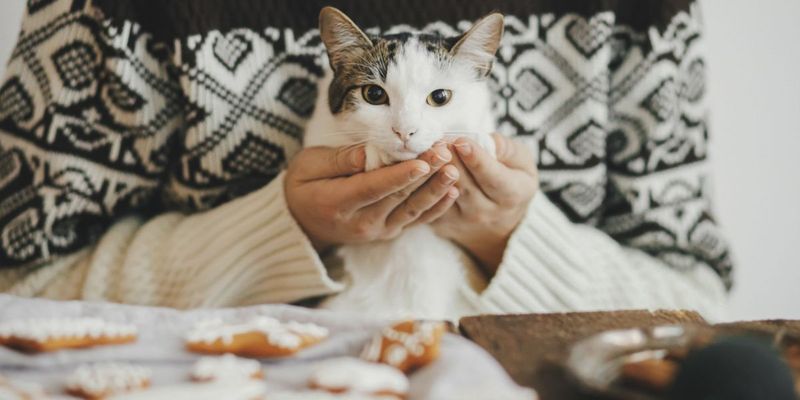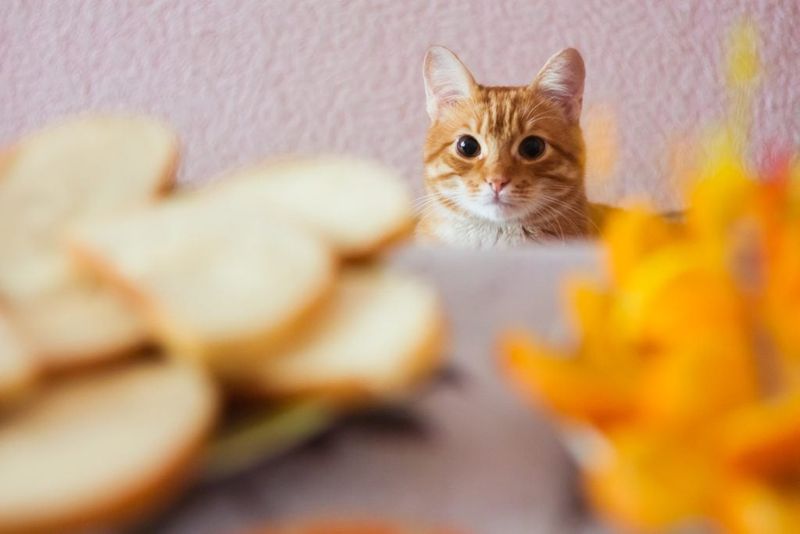📖 Table of Content:
Cats have an undeniable curiosity, especially when it comes to food. Their keen senses often lead them to investigate anything that smells interesting, including the meals humans enjoy. While some human foods may seem harmless, others can be dangerous or even toxic to cats.
Many common foods that we consume daily can pose serious health risks to feline companions. Even if your cat gives you their most persuasive, pleading eyes, it’s important to remember that not all foods are suitable for them. Some of these seemingly innocent snacks can lead to digestive upset, poisoning, or long-term health problems.
Understanding which foods are safe and which are harmful is crucial for any cat owner. While it’s tempting to share a bite with your furry friend, certain foods should be strictly off-limits. Below are 13 foods that might attract your cat, but are best kept out of their reach for their well-being.
1. Onions and Garlic
Often hidden in our cooking, onions and garlic are toxic to cats. These common ingredients can damage a cat’s red blood cells, leading to anemia. Picture a cat weaving through your legs as you chop onions for dinner.
It’s easy to overlook the danger lurking in such innocent moments. Garlic and onion powders can be even more potent. Maintain a safe environment by keeping these ingredients away from feline friends.
If ingested, symptoms might not appear immediately but can escalate quickly. Be vigilant and consult your vet if you suspect consumption.
2. Grapes and Raisins
While grapes and raisins might seem harmless, they pose a severe risk to cat health. These fruits can cause kidney failure in cats. Now, imagine a sprightly cat batting a grape around the kitchen floor.
Seemingly harmless play can turn dangerous if ingested. The exact toxin is unknown, making prevention the best strategy. Never leave grapes or raisins within paw’s reach.
It’s a simple step that could save a feline’s life. Symptoms like vomiting or lethargy post-ingestion require immediate veterinary attention. Keep these fruits out of sight and out of mind for your kitty.
3. Alcohol
Alcohol isn’t just a human indulgence but a serious threat to cats. Even a small sip can lead to alcohol poisoning in felines. Imagine a curious cat pawing at your wine glass during a cozy evening.
Such instances, though endearing, can quickly turn alarming. Cats metabolize alcohol far more slowly than humans. Symptoms like disorientation or vomiting demand urgent care.
Prevent curious sips by keeping alcoholic beverages out of reach. Use closed containers or store drinks promptly. Remember, prevention is better than cure when it comes to feline safety.
4. Chocolate
A sweet treat for humans but a toxic hazard for cats, chocolate contains theobromine. This substance is difficult for cats to metabolize. Even a small amount can cause tremors, seizures, or worse. Imagine your cat’s curiosity piqued by the rich aroma as you unwrap a chocolate bar.
In such moments, it’s crucial to remember that even a sniff can be harmful. Always store chocolate safely out of reach. If your cat ever consumes chocolate, immediate veterinary care is essential. Quick action can prevent serious health issues.
So, next time you indulge, ensure your kitty isn’t tempted.
5. Caffeine
The allure of a warm cup of coffee can tempt more than just humans. Caffeine, found in coffee, tea, and energy drinks, is toxic to cats. Envision a cat mesmerized by the steam rising from your morning brew.
This seemingly harmless scene poses real danger. Caffeine affects the heart and nervous system of felines, leading to rapid breathing or heart palpitations.
Ensure your cat isn’t lured by these daily rituals. Keep caffeinated beverages out of paw’s reach and clean up any spills immediately.
Vigilance can keep your feline safe from unexpected caffeine encounters.
6. Raw Eggs
Raw eggs may seem harmless, but they pose risks like salmonella or E. coli. Furthermore, they contain an enzyme called avidin that hinders biotin absorption, affecting a cat’s skin and coat. Picture a cat curiously sniffing at a bowl of raw eggs.
It’s easy to see how curiosity can lead to trouble. Cooked eggs are a different story, offering protein safely. Always ensure eggs are properly cooked before offering them to a cat.
If your feline friend shows interest, be cautious and educate yourself on safe feeding practices. Prevent potential health issues with simple precautions.
7. Dairy Products
The image of a cat lapping up milk is iconic yet misleading. Most adult cats are lactose intolerant, and consuming dairy can lead to digestive upset. Picture this: a cat eagerly lapping up milk, only to suffer later.
It’s a common misconception that milk is a treat for cats. Instead, offer water or specially formulated cat milk. Keep regular dairy products safely away.
Should any dairy be consumed, monitor for signs of discomfort like diarrhea. Consulting a vet can guide dietary choices. Remember, happiness is a healthy cat!
8. Bones
Cooked bones might seem like a natural treat but pose a choking hazard. They can splinter and cause internal damage. Imagine a cat’s eyes widening at the sight of a juicy bone!
This temptation is best avoided. Raw bones can be safer but should be given cautiously. Supervision is key when it comes to bones.
If your cat swipes a cooked bone, consult a vet immediately. Prevention and awareness can safeguard against potential dangers. Prioritize your cat’s safety by keeping bones off their menu. A little caution goes a long way.
9. Raw Fish
While raw fish might appear to be a feline feast, it could lead to a thiamine deficiency, harming their neurological health. This important vitamin plays a vital role in brain function. Imagine your cat drawn to that tempting raw fish sitting on the counter.
Such moments can endanger health if not monitored. Cooking fish destroys enzymes that degrade thiamine. So, if fish is on the menu, cook it first!
Enjoying fish with your cat can be done safely with precautions. Immediate vet consultation is advised if raw fish is ingested. Protect your pet with awareness and safe food practices.
10. Avocado
Humans love avocado, but it’s a different story for cats. The fruit contains persin, which can be toxic to felines. Imagine your cat sniffing that freshly sliced avocado—looks tempting, but it’s actually a health hazard.
Such curiosity, though cute, can lead to health issues. Symptoms include vomiting and diarrhea. Avocados should be kept out of feline sight and smell.
If your cat ingests avocado, watch for signs of discomfort and seek veterinary help. Awareness is key to preventing potential harm. Remember, what’s healthy for humans isn’t always safe for cats.
11. Xylitol
Found in sugar-free products, xylitol is extremely dangerous to cats. It can cause a rapid insulin release, leading to hypoglycemia. Imagine a cat sniffing around a pack of sugar-free gum.
Such seemingly harmless exploration can turn deadly. Keep products containing xylitol securely stored away. Immediate symptoms include lethargy or seizures.
If you suspect xylitol ingestion, seek veterinary care quickly. Being proactive ensures your cat stays safe from this hidden danger. Awareness of ingredients around the house can protect your beloved pet.
12. Nuts
Though nutritious for humans, nuts can be problematic for cats. Some, like macadamia nuts, are specifically dangerous, causing weakness or tremors. Visualize a cat intrigued by a bowl of nuts left unattended.
It’s easy for a playful nibble to lead to health issues. Keeping nuts out of reach is a wise precaution. Contact a vet if your cat consumes any.
Understanding which snacks are safe can prevent mishaps. Remember, a few simple steps can ensure your cat’s health and happiness. Stay informed to keep your furry friend safe and sound.
13. Yeast Dough
Yeast dough might seem like a harmless kitchen staple, but it’s risky for cats. As dough rises, it expands in the stomach, causing pain or bloating. Imagine a cat eying a bowl of rising dough on the counter.
Such moments require careful attention. Consuming raw dough can lead to alcohol poisoning as well. Prevent potential issues by keeping dough out of reach.
If your cat gets into yeast dough, seek immediate veterinary care. Small actions can prevent severe consequences. Always prioritize safety in the kitchen to protect your pet.
